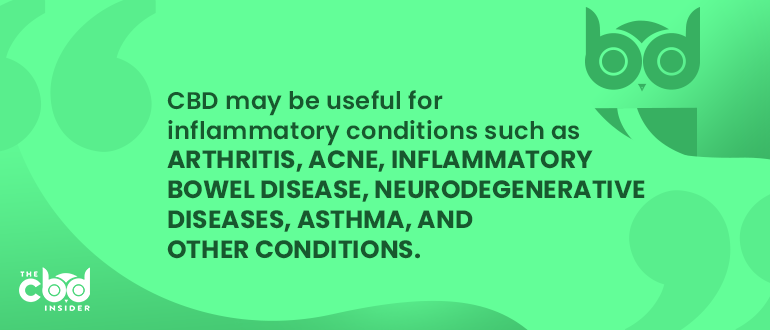-
- Market Research
- |
- CBD Near Me
- |
- Giveaways
- |
- Newsletter
- |
- Contact
- |
- Advertise
- |

Researchers from all around the world are finding that cannabidiol (CBD) may help with inflammation. Scientific research indicates that CBD may have what it takes to treat inflammatory diseases such as arthritis, inflammatory bowel disease, and more. CBD may help relieve chronic inflammation by regulating the aspects of the immune system responsible for producing inflammation. This makes CBD a viable therapy for treating patients with inflammatory conditions.
What Causes Inflammation?
Inflammation is a normal response by the immune system to injuries, foreign bacteria, or viruses.
The immune system releases proinflammatory proteins called cytokines which target infections and injuries.
As the cytokines accumulate, they cause inflammation.
Without this inflammatory response, the body could not heal from wounds.

However, if inflammation persists, it can damage tissue instead of healing it.
In some cases, the body mistakenly attacks healthy tissue that it perceives as foreign or diseased.
Conditions characterized by this faulty response are considered autoimmune disorders.
Autoimmune disorders result in chronic inflammation since the immune system cannot heal the non-existent wound.
CBD as an Anti-Inflammatory Therapy
In several studies, researchers suggest that CBD may be an effective anti-inflammatory therapy for a wide range of conditions.
The following research shows CBD’s anti-inflammatory capabilities in arthritis, Alzheimer’s disease, inflammatory bowel disease, and acne:
Arthritis

Inflammation in the joints is the hallmark of arthritis.
Inflammation can cause pain and discomfort, making it difficult for patients to move around.
A study by the University of Kentucky College of Pharmacy and College of Medicine tested topical CBD on a rat model of arthritis to find out if CBD could reduce inflammation and pain.
Researchers found that CBD reduced a primary cytokine involved in inflammation, tumor necrosis factor (TNF).
They also found that the expression of the TRPV1 receptors increases after inflammation.
However, CBD seems to desensitize TRPV1, which can help prevent the progression of inflammation.
Reducing inflammation also seemed to help decrease the expression of pain-related behaviors in the rats.
The study’s data indicate topical CBD is a viable option for treating arthritis inflammation and pain.
Alzheimer’s Disease
Alzheimer’s disease involves inflammation of nervous tissue, which is called neuroinflammation.
Two occurrences in the brain seem to cause the neuroinflammation seen in Alzheimer’s: beta-amyloid plaques (also called senile plaques) and tau tangles.
The inflammation caused by the plaques and tangles creates a neurotoxic environment, leading to the death of neurons and, ultimately, cognitive decline.
A review conducted by Western Sydney University and Neuroscience Research Australia investigated the evidence of the therapeutic properties of CBD for Alzheimer’s disease.
The researchers found that CBD produced anti-inflammatory effects in rodent studies of Alzheimer’s.
CBD decreased inflammation by inhibiting the effect of the beta-amyloid plaques, reducing nitric oxide (a free radical), and suppressing the expression of cytokines and other biomarkers of inflammation through PPAR receptors.
While more research is needed to identify more of the mechanisms CBD uses to reduce inflammation, the evidence supporting CBD’s potential to treat Alzheimer’s seems reliable.
Inflammatory Bowel Disease
Inflammatory bowel diseases (IBD), like Crohn’s disease, are characterized by inflammation in a specific area of the bowel (e.g., the colon) or the entire bowel.
These diseases are autoimmune disorders, so regulating the immune system is crucial.
Sapienza University of Rome conducted a review of scientific literature regarding CBD’s treatment potential in inflammatory bowel disease.
Researchers found that CBD can induce the natural death of cytokines and ease inflammation by activating the PPAR and GPR55 receptors.
This finding led researchers to conclude that CBD is a potential candidate for a new type of anti-IBD treatment.
Acne
Acne is an inflammatory skin disease, characterized by excess fatty oil and an accumulation of bacteria in the pores.
A study led by the University of Debrecen in Hungary tested the effect of CBD on human sebaceous glands, the glands responsible for the overproduction of a fatty oil called sebum in acne.
The scientists found that CBD reduced inflammation in the sebaceous glands.
CBD prevented the expression of TNF and lowered the levels of other cytokines, IL1B and IL6.
CBD prevented a signaling pathway for inflammation as well.
Scientists concluded that CBD has potential as a therapy for acne.
CBD May Reduce Your Inflammation
The scientific research on CBD’s anti-inflammatory properties is plentiful.
It indicates CBD is useful for many inflammatory conditions such as arthritis, acne, inflammatory bowel disease, neurodegenerative diseases, asthma, and other conditions.
As a result, CBD seems to have a bright future in treating inflammation as a safe, effective therapy.

Have you used CBD to reduce inflammation? What kind of results did you achieve? Tell us your story in the comments below!
Disclaimer: The content on this site is for informational purposes only. We are not medical experts and nothing should be construed as medical advice. Be sure to speak with your physician before taking CBD or any other treatment.







